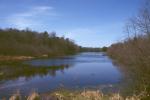Climate News & Issues
Statewide/Regional
National
- National Climatic Data Center's Global
Climate Change
- U.S. Department of State's
Bureau of International Information Programs recently
issued the following press releases as part of a
series about necessary steps needed to address
the effects of climate change at regional and local
levels.
- The US Climatic Change Science Program has the
following series of "Synthesis and Assessment
S&A Products" including:
- "Climate Models: An Assessment of
Strengths and Limitations" (in July 2008) that describes
computer models created to simulate the Earth's
climate and their ability to model current climate
change. Press
release
- "Analyses of the effects of global change on
human health and welfare and human systems" (in July
2008) that discusses the potential impacts of
climate change on human health, human welfare, and
communities in the United States. Press
release
- "Weather and Climate Extremes in a Changing
Climate" (in June 2008) that provides a
comprehensive analysis of observed and projected
changes in weather and climate extremes across North
America and the US territories. Press
release
- Scientists at the National Climatic Data Center
recently announced that based upon their preliminary
analysis of available weather data for 2006, the just
completed year was the warmest nationwide since
relatively comprehensive records began in 1895. The
coterminous US annual average temperature was 55
degrees Fahrenheit, or 2.2 Fahrenheit degrees above
the 20th century long term average temperature and
0.07 Fahrenheit degrees above the previous highest
nationwide temperature set in 1998. [NOAA
News]
- NOAA issued its 2005 Annual Greenhouse Gas Index,
which is based upon benchmark measurements of
atmospheric gases that could affect the planetary
climate. For 2005, the index indicated an increase in
carbon dioxide and nitrous oxide, little change in
methane, and a decrease in two types of
chlorofluorocarbons. [NOAA
News]
- The US Climatic Change Science Program issued a
report in early May 2006 that is the first of 21
"Synthesis and Assessment S&A Products". This
first report entitled "Temperature Trends in the Lower
Atmosphere: Steps for Understanding and Reconciling
Differences" is meant to improve understanding of
atmospheric temperature change in the context of
global climate change and how humans have an influence
upon these temperature trends. [NOAA
News]
- NOAA working to improve understanding of climatic
change [NOAA
News]
- NOAA documents World's Oceans Warming over the
past 40 years [News
Release]
- American Association of State Climatologists' Policy
Statement on Climatic Variability and Change
- American Meteorological Society's Policy
Statements: On
Global Climate Change and Climate
Change Research: Issues for the Atmospheric and
Related Sciences
UW-Madison professor with IES-SAGE cautions that
climate
change could bring a wave of new health
risks.
Global
-
Record Global Temperatures in 2010 -
Report from NOAA
- The Intergovernmental Panel on Climate Change
(IPCC)
Background -- The IPCC
was established as a scientific intergovernmental body
by the World Meteorological Organization (WMO) and by
the United Nations Environment Programme (UNEP). to
provide the decision-makers and others interested in
climate change with an objective source of information
concerning climate change.
Commencing in 1990, the IPCC has produced four
assessment reports (1990, 1995, 2001 and 2007).
- The most recent IPPC 2007 Report was presented in
four parts from the four working groups:
- The first part of the new Intergovernmental
Panel on Climate Change IPCC 2007 Report, "The
Physical Science Basis" was issued on 2 February
2007 that describes the latest on human-caused
global warming and its future worsening. This most
authoritative report is based on six years of new
observations and analyses.
- A second part of the IPCC 2007 Report, "
Impacts, Adaptation and Vulnerability" , was issued on
6 April 2007 that describes what the effects of the
projected increases in global temperatures during
the rest of the century would have upon societies,
ecosystems, and the hydrologic cycle. Adaptation and
vulnerability of these systems to climatic change
are also addressed.
- The third part of the IPCC 2007 Report, entitled
"Mitigation
of Climate Change" was released on 4 May 2007 in
Bangkok, Thailand. This part of the IPCC report
focuses upon the scientific, technological,
environmental, economic, and social aspects of
mitigating projected climate change. It is intended
as a summary for policymakers. Delegates contend
that the technology and money are currently
available for aggressive actions to limit emissions
of greenhouse gases, improve fuel efficiency, and
utilize renewable energy resources such as solar
power in order to avoid some increases in global
temperatures and associated climate-related
disasters.
- The fourth and final part of the IPCC 2007
Report was issued in -November 2007 and called "Synthesis Report", serves as a scientific "instant guide"
for policymakers.
Note: the entire current IPCC
Report is including scientific details is available
from the IPCC
site. This 4th report and the previous three
IPCC Reports are also available from
IPCC.
- The American Meteorological Society's Information
Statement on Climate Change [4 pages] was issued
on 1 February 2007. This short report summarizes many
topics covered in the IPCC report, in a shorter text
and without figures.
- National Climatic Data Center's Global
Climate Change
- NOAA documents World's Oceans Warming over the
past 40 years [News
Release]
- Shorter
river ice seasons confirm global warming - CNN
features UW-Madison research
- Global
Change Master Directory (NASA)
- Climate
Variability and Climate Change - Global Hydrology
and Climate Center
- Goddard
Institute for Space Studies Datasets and
Images
General
Information
|
|
|
|

